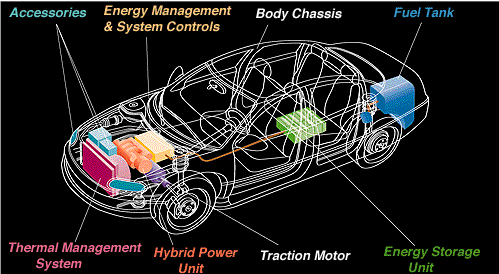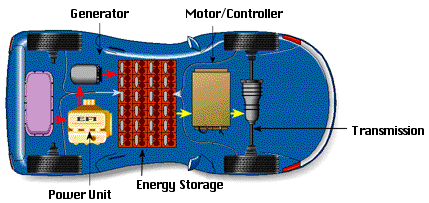There is a less costly alternative to motor vehicles. The electric vehicle doesn’t require gas, needs very little maintenance, and keeps our environment cleaner. However, it is going to take some time before full-scale manufacturing and distribution take place. First, big auto manufactures and oil companies are fighting zero emission regulations until the supply of oil is gone. Second, improvements and technological advances need to “fine tune” the electric vehicle. Last, the recent electricity shortages in California present a problem in the near future for Californians and concern about producing a machine that could cause power outages elsewhere. Although it may take a few decades for electrical cars to replace motorized vehicles, it will happen.
Electric vehicles are powered through battery packs. There will no longer be a need to purchase gasoline. Volatile gas prices and dependence on foreign oil will be a thing of the past.
click here for more fun information.


To remove the gasoline bill from the average Americans yearly income would mean huge yearly saving for most. (I am aware that Alaskans would be hurt if big oil companies did not turn big profits, I am writing here about the average American.) The main people against the production of electric vehicles are the large oil companies. Large oil companies are against the manufacturing of the electric car because it would mean money out of their pockets. Experts estimate that the worlds supply of oil will dry up in approximately 50 years, so these companies want to squeeze as much money out of the oil fields as they can before they are gone. The oil companies are using their lawyers (money) to fight the present regulations for zero emission cars rather than using their engineers to solve the problems of getting these cars into production.
The United States depends to a large degree on oil from foreign countries, particularly in the Middle East. Without the need for foreign oil, the U.S. will have more leverage when dealing with foreign governments. Also, military costs could eventually be reduced due to a huge decrease in the fuel required to run all the military vehicles. For the same level of service, electricity doesn’t involve expensive exploration, obtaining, transporting, and storing of fossil fuels.


Maintaining and fixing mechanical failures also adds up at the end of a year. The hardest part about maintaining the electrical vehicles is adding water to the batteries once a month. For vehicles with sealed batteries, you don’t even have to do this. In addition, the battery pack needs to be changed every 3 to 4 years. In electrical vehicles there are is no engine, gas tank, spark plugs, radiators, alternators, fuel filters, water pumps, or exhaust system. This means fewer breakdowns, and no more expensive oil changes or tune-ups.
The electric vehicle is not perfect at this point by any means. It is still in the early years of development.


This is a hybrid vehicle which is a close relative to the electric vehicle. It uses some gasoline, however considerably less.
Attributes
Overall Quite Operation
Satisfactory Handling, including bad weather
Zero Emissions Vehicle
Charging Convenience
Lower Cost to Fuel
Air Conditioning was adequate
Warm weather operation
Limitations
Range
Mechanical Problems - including the transmission
Acceleration (steep grade and from stop)
Cold Temperature Operation
Electric Cabin Heater/Defroster
Whine from belt at most temperatures
Cost of Vehicle
Time to Charge
Cold weather operation

Motor vehicles generate more air pollution than any other man-made machine. Because there is no tailpipe, no CFCs, carbon monoxide, methane, HC, Nox, and troposhperic ozone can be emitted into the atmosphere. The price of a healthy environment is immeasurable.
click here for a link to tons on fun.

Electrical vehicles are 97% cleaner that the gas car, and this includes the emissions from the power play. As we move away from fossil fuels and toward renewable, electrical vehicles get cleaner and cleaner. Gas cars as they age get dirtier and dirtier. Recycling the batteries from electrical vehicles would be the greatest environmental concern, but even now, lead acid batteries are one of the most recycled items around and have been for many years. If the lithium battery is successfully brought to market this will solve many problems at once. It has greater energy density than lead acid or NiCd batteries and could be much cheaper that the Nickel-metal-hydride batteries with very little environmental problems.


The recent rolling black outs in California are due to a shortage of electricity. This is of concern to electric car manufactures. They are hoping that by the time electrical vehicles become popular, that larger more efficient electrical plants will be constructed that will easily be able to handle the demand for electricity.


Large oil and auto manufacturing companies keeping gasoline burning vehicles on the streets will delay the emergence of the electrical vehicle. Technology will play a major role in the production of the electric vehicle. It will take years for the kinks to be worked out to ensure maximum efficiency, quality, and safety. Recent energy shortages scare people into believing that electricity is going away. These all play a role in delaying the mass production of the electrical vehicle. However, the need for a gasoline and maintenance free environmentally safe alternative is necessary. With the decline in oil, and the construction of electrical plants increasing, electrical vehicles will become even more attractive for the consumer. The Electrical vehicle will be as much a part of everyday life as the motor vehicle is today, it’s just a matter of time.